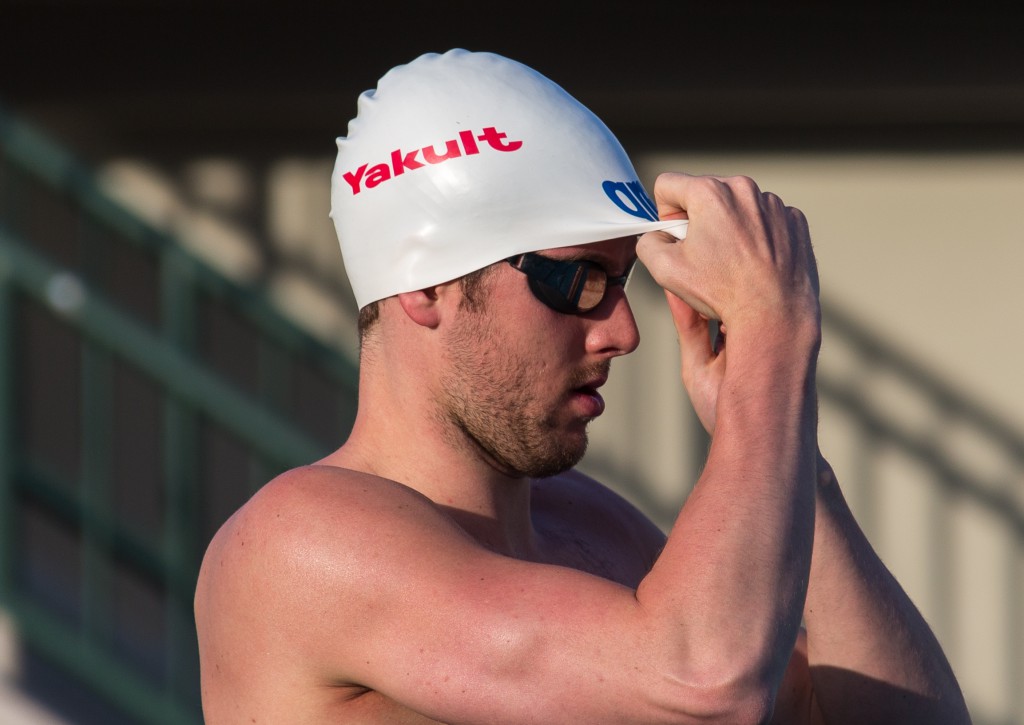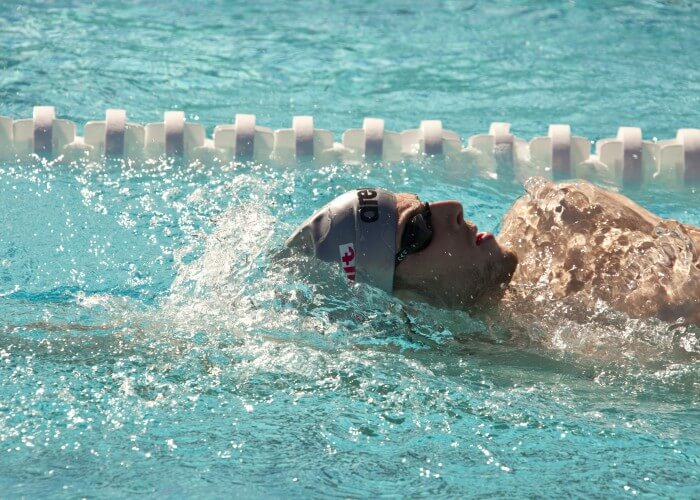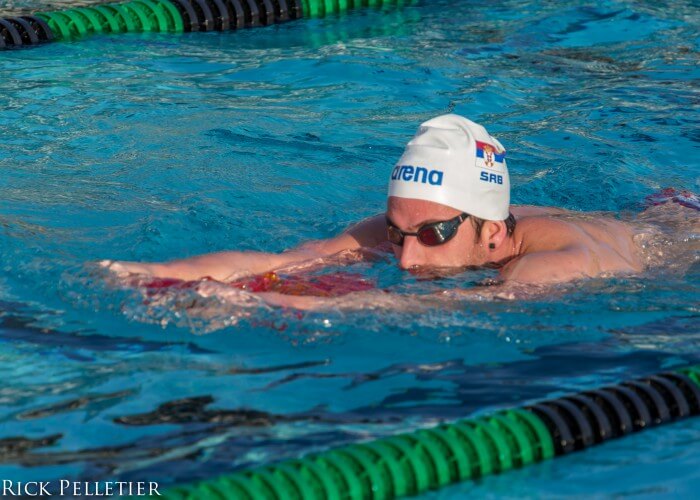An Interview with Bogdan Knezevic: World-Class Swimmer and Rhodes Scholar

By Sophia Chiang, Swimming World College Intern
Bogdan Knezevic was only two when, in 1994, he and his parents fled from war in Serbia to Canada. Since then, he’s gone on to swim at some of the world’s most prestigious meets: from placing top at Canadian Varsity Championships to swimming at World Championships, all the while graduating with a near perfect GPA and a BSc Neuroscience from the University of Calgary. Today, he’s starting a new chapter in both his swimming and academic careers at the University of Oxford as a Rhodes Scholar.
Knezevic has been a force to be reckoned with both in and out of the pool, dropping times such as his 2:00.6 in the 200 IM (2009 Tri Nations), 4:26.0 in the 400 IM (2013 Canadian Nationals), 2:16.0 in the 200 breaststroke (2014 European Championships), and a 1:03.0 in the 100 breaststroke (2015 Canadian Varsity Nationals), meanwhile accumulating accolades such as the Academic All-American Athlete of the Year (2013) and the Academic All-Canadian Scholar Athlete Award (2014).
Knezevic is one of two swimmers, the other being former University of Michigan swim captain David Moore, to be scholars-elect at Oxford this coming year. Swimming World Magazine caught up with Knezevic at the start of the Oxford term, where he described his first week as a “tornado of events.”
S: So you’re a Rhodes scholarship recipient this year and you’ll be heading from the University of Calgary to Oxford University. Does that mean we’ll be seeing you at the Oxford v. Cambridge Varsity meet, and, more importantly, BUCS?
B: Well, I am just starting to get settled in at Oxford. Currently, I’m trying to orient myself and get a sense of how my schedule will look like, to see how much time is feasible for me to spend in the pool. I would, of course, love to compete for the team if I can at any of the bigger meets. Besides, I can’t pass up on a chance to outrace some Cambridge students, can I?
S: Sounds like a great strategy! You’ve discussed in your past how things weren’t always going so well—how your parents emigrated to Canada from Serbia speaking little to no English, how your family braved Canadian winters in -36 C without a car, and how your work ethic today has been influenced by your parents’ growing up. Throughout all these difficulties, what got you into the water in the first place?
B: As a child, I had an abundant amount of energy. My parents recognized early on that that energy could be directed into something athletic, so I was placed in a bunch of different teams across many sports. Swimming ended up being the one I liked most, and was the best at.
S: But today, swimming obviously isn’t your only focus, and you’re very good at balancing swimming with your academics. Has swimming played a part in your academic experience, and if so, how?
B: It most definitely has. The relationship works both ways—swimming has kept me healthy, obviously, but it has also given me a high degree of mental clarity. I feel refreshed after a workout, and it gives me a chance to escape and unwind from my academic obligations. At the same time, school gives me something to direct my energy to that isn’t sport, so it’s a distraction in that sense. It’s a way for me to compete with myself outside of the sport. Maintaining this balance has been critical in my career.
S: Speaking of academics, your 3.97 GPA and BSc Neuroscience from Calgary shows a deep interest in your academic field. Outside the pool, you’ve been doing some really fascinating research. Tells us about that, and what research are you interested in doing these coming years?
B: Most of my undergraduate research was focused on learning and memory. More specifically, constructing experiments to take abstract, complicated ideas and test them in simple, effective ways, via animal models. To put it in the most interesting way possible, I looked at the relationship between a compound found in dark chocolate and memory. In a nutshell, we found that this element of dark chocolate helps to improve long-term memory, and helps protect memories from environmental stresses in our animal model. My research in the coming years has taken a bit of a different direction. At Oxford, I will be involved in the medical genomics field. I’ll be investigating relationships between genes and immune function, with a focus on applying our research in a clinical setting.
S: Looks like we’ll be eating more dark chocolate! Returning to your athletic career, you’ve mentioned how you narrowly missed qualifying for the London Olympics. Moving forwards, how has that experience changed you as a student of the sport and as a competitor?
B: That year was an emotional rollercoaster, to say the least. Immediately following my last race, when I realized I would narrowly miss the invite, I was pretty devastated. But that was expected and I was, importantly, okay with letting myself feel that. In the end, I realized that I was just very happy, honored, and privileged to not only have come so close to qualifying, but also to have been given an opportunity to do so. Going into the next school year, I was much more relaxed. I dove into various academic and community initiatives, and didn’t put as much pressure and expectation on swimming. That year happened to be my best in the sport, and I went on to race at the Barcelona World Championships that summer, as well as the Eindhoven and Berlin World Cups. Looking back, missing the Olympic team gave me some perspective on the blessings I have had in life, and took off some of the stress that we as competitors frequently feel.
S: Sounds like you’ve learned a lot. What lessons from swimming at Calgary do you think you’ll be bringing to Oxford?
B: Following a program and trusting a plan. This was definitely something I struggled with when I first made the move to varsity swimming. The training program at Calgary was very different from my program on my age group team, so I think I didn’t buy in or trust it enough at the start, which really hurt my performance. Once I started trusting it more around 2013, I started racing better, with much better results.
S: And what do you think you’ll be bringing to the table for the Oxford swim team?
B: I think I will most likely share a lot of traits with the other swimmers already there—persistence, work ethic, determination, etc. Hopefully I will be able to bring a “breath of fresh air” in some way, as any new, experienced member brings to a team he or she joins.
S: Right. You’ve put up some phenomenal times in the past years, and I noticed you seem to mostly favor IM and breaststroke. What is your favorite event to swim, and what do you think drives you to excel in it?
B: I think the 200 IM probably is. It’s a mid-distance event, which tends to be what I am good at, and it includes all those transitions, which make the event exciting. I think that it’s just the balance of excitement, intensity, and fun associated with a 200 IM that makes me want to do well.
S: You certainly have posted some great times in that event. Is Rio 2016 a goal for you? What other short/long term goals will you be aiming for?
B: Right now I am just focusing on settling in and getting used to everything here. Oxford is unlike any other place in the world, and it exists in its own “bubble” of sorts. I need to establish a schedule with my supervisor, and balance this with the various events going on at Oxford and in Rhodes House. I’m aiming to start incorporating swimming/athletics in general into my routine as soon as possible, so right now I’m just working towards that.
S: Yes, you’ve just completed Freshers’ Week there, so it’s undoubtedly insanely busy. Other than the Rhodes Scholarship, what made you believe that the Oxford swimming program would be right for you? Also, how does that factor into any Olympic aspirations you may have?
B: Missing the Olympics gave me some perspective and took some pressure off the sport. I tend to perform best when I don’t stack too much pressure on myself, so my plan/hopes of coming to Oxford were constructed entirely around the Rhodes Scholarship. Now that I’ve secured that, I can look into how to try and make swimming work. The Rhodes Scholarship was something that I really connected with, when I first looked into applying for it. The ideals of the Scholarship really resonated with me, and I realized that this was what I wanted. It’s something that will shape the rest of my career and my life in ways that swimming hasn’t. Don’t get me wrong, I am not trying to take away from the sport in any way, and I am thankful for all that swimming has taught me. Rather, I have just come to realize that there are various aspects of my life that I would like to develop, aspects that swimming didn’t necessarily develop, at least directly.
So for me, it wasn’t a matter of “Where should I go to have the best shot at Rio?” but was more along the lines of “Is studying at Oxford as a Rhodes Scholar something that matters to me, to the point that I may have to stop swimming and miss out on Rio?” Once I answered that, and was successful getting the Rhodes Scholarship, I turned my attentions to looking at how to incorporate swimming into my life here. This way, I will be doing the sport purely out of internal factors, which may provide me with a lower pressure platform from which I may end up swimming well.
We wish the best of luck to Bogdan Knezevic in both his academic and athletic endeavors. For all the BUCS championship fans out there, hopefully you’ll see Knezevic take to the pool at the short course BUCS championships November 13-15th, 2015 at Ponds Forge, Sheffield.






Thanks for sharing this information about a very inspirational young man.